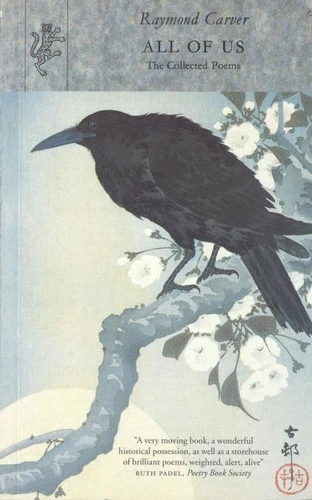All of Us. The Collected Poems
Par :Formats :
Disponible dans votre compte client Decitre ou Furet du Nord dès validation de votre commande. Le format ePub protégé est :
- Compatible avec une lecture sur My Vivlio (smartphone, tablette, ordinateur)
- Compatible avec une lecture sur liseuses Vivlio
- Pour les liseuses autres que Vivlio, vous devez utiliser le logiciel Adobe Digital Edition. Non compatible avec la lecture sur les liseuses Kindle, Remarkable et Sony
- Non compatible avec un achat hors France métropolitaine
 , qui est-ce ?
, qui est-ce ?Notre partenaire de plateforme de lecture numérique où vous retrouverez l'ensemble de vos ebooks gratuitement
Pour en savoir plus sur nos ebooks, consultez notre aide en ligne ici
- Nombre de pages416
- FormatePub
- ISBN978-1-4481-0508-3
- EAN9781448105083
- Date de parution28/01/2016
- Protection num.Adobe DRM
- Infos supplémentairesepub
- ÉditeurVintage Digital
Résumé
Raymond Carver, who became a master-storyteller of his generation and was hailed in Europe as 'the American Chekhov', wrote of himself: "I began as a poet. My first publication was a poem. So I suppose on my tombstone I'd be very pleased if they put 'Poet and short-story writer - and occasional essayist', in that order." This complete edition allows readers to experience the range and overwhelming power of Carver's poetry for the first time.
It brings together in the order of their American publication the poems of Fires (1985), Where Water Comes Together with Other Water (1986), Ultramarine (1988), A New Path to the Waterfall (1989) and No Heroics, Please (1991). For readers who know Carver's middle period only through his selected poems, In a Marine Light (1988), it includes the windfall of 51 poems not previously published in Britain.
All of Us is edited by Professor William L. Stull of the University of Hartford, and introduced with an essay on Raymond Carver's methods of composition by his widow, the poet Tess Gallagher.
It brings together in the order of their American publication the poems of Fires (1985), Where Water Comes Together with Other Water (1986), Ultramarine (1988), A New Path to the Waterfall (1989) and No Heroics, Please (1991). For readers who know Carver's middle period only through his selected poems, In a Marine Light (1988), it includes the windfall of 51 poems not previously published in Britain.
All of Us is edited by Professor William L. Stull of the University of Hartford, and introduced with an essay on Raymond Carver's methods of composition by his widow, the poet Tess Gallagher.
Raymond Carver, who became a master-storyteller of his generation and was hailed in Europe as 'the American Chekhov', wrote of himself: "I began as a poet. My first publication was a poem. So I suppose on my tombstone I'd be very pleased if they put 'Poet and short-story writer - and occasional essayist', in that order." This complete edition allows readers to experience the range and overwhelming power of Carver's poetry for the first time.
It brings together in the order of their American publication the poems of Fires (1985), Where Water Comes Together with Other Water (1986), Ultramarine (1988), A New Path to the Waterfall (1989) and No Heroics, Please (1991). For readers who know Carver's middle period only through his selected poems, In a Marine Light (1988), it includes the windfall of 51 poems not previously published in Britain.
All of Us is edited by Professor William L. Stull of the University of Hartford, and introduced with an essay on Raymond Carver's methods of composition by his widow, the poet Tess Gallagher.
It brings together in the order of their American publication the poems of Fires (1985), Where Water Comes Together with Other Water (1986), Ultramarine (1988), A New Path to the Waterfall (1989) and No Heroics, Please (1991). For readers who know Carver's middle period only through his selected poems, In a Marine Light (1988), it includes the windfall of 51 poems not previously published in Britain.
All of Us is edited by Professor William L. Stull of the University of Hartford, and introduced with an essay on Raymond Carver's methods of composition by his widow, the poet Tess Gallagher.





















